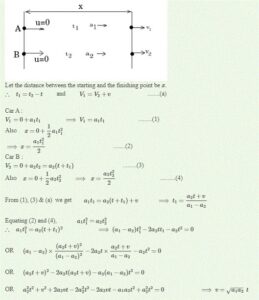Is your car giving off a distinctive sound, like that of a racing car? You’re not alone in this puzzling situation. But fear not, as we’re here to help you uncover the reasons behind this unexpected noise. Whether you’re a speed enthusiast or simply searching for a quieter ride, understanding why your car sounds like a racing car is the first step towards finding a solution. In this article, we’ll delve into the potential causes, from engine issues to exhaust troubles, that might be responsible for your car’s exhilarating sound. So let’s unravel the mystery behind why your car sounds like a racing car!
Why Does My Car Sound Like a Racing Car?
Have you ever been driving down the road and suddenly noticed that your car sounds like a racing car? The revving engine, the loud exhaust, and the overall power-packed sound can be quite exhilarating. But why does your car sound like a racing car? In this article, we will delve into the various factors that contribute to this phenomenon.
The Engine: The Heart of the Racing Sound
The engine is the primary component responsible for the powerful sound of a racing car. The type of engine and its design play a significant role in creating that distinctive rumble. Here are some key factors related to the engine that contribute to the racing car sound:
1. Engine Size and Cylinder Configuration
The size of the engine, usually measured in liters or cubic centimeters (cc), directly impacts the sound it produces. Larger engines tend to create a deeper and more intense sound. Additionally, the cylinder configuration, such as V6, V8, or V12, also influences the sound. The arrangement of the cylinders affects the firing order, resulting in unique sound patterns.
2. Exhaust System Design
The exhaust system is another crucial component that affects the sound of a car. Performance-oriented vehicles, including racing cars, often feature high-performance exhaust systems. These systems are designed to enhance engine efficiency and generate a louder and more aggressive sound. The design includes wider pipes, fewer mufflers, and special resonators to amplify the engine noise.
3. Aftermarket Modifications
Car enthusiasts often modify their vehicles to achieve a more racing car-like sound. Aftermarket modifications, such as installing a cold air intake, high-flow catalytic converter, or a performance exhaust system, can significantly alter the sound produced by the engine. These modifications aim to increase airflow and optimize engine performance, resulting in a more prominent and aggressive sound.
The Role of Air Intake Systems
While the engine is responsible for producing the racing car sound, the air intake system plays a vital role in enhancing it. Here’s how it contributes:
1. Induction Noise
The air intake system brings oxygen into the engine for combustion. In racing cars, the design of the air intake system is often optimized to generate induction noise. Induction noise is the sound produced when the engine draws in air, resulting in a pleasing growl that adds to the overall racing car experience.
2. Cold Air Intakes
Cold air intakes are aftermarket modifications that replace the stock air intake system. These systems help to increase engine performance by drawing in cooler air from outside the engine compartment. This colder air is denser, providing more oxygen for combustion and resulting in a more aggressive engine sound.
The Impact of Exhaust Systems
The exhaust system not only contributes to the sound but also affects the overall performance of a car. Here’s how different exhaust system components influence the racing car sound:
1. Exhaust Headers
Exhaust headers, also known as exhaust manifolds, collect exhaust gases from the engine’s cylinders and direct them into the exhaust system. Racing car exhaust headers are designed with larger tubes and smoother bends, allowing for better flow and increasing the overall sound and performance.
2. Mufflers and Resonators
Mufflers and resonators serve the purpose of reducing noise levels in a car’s exhaust system. However, in racing cars, these components are often replaced or modified to create a more aggressive sound. Performance mufflers and resonators have a straight-through design, allowing for less restriction and producing a louder exhaust note.
3. Exhaust Tips
Exhaust tips are the visible part of the exhaust system, positioned at the rear of the vehicle. While they don’t directly affect the sound, they can contribute to the overall aesthetic appeal of a racing car. Many racing cars have larger, polished, or chrome-tipped exhausts, adding to the aggressive appearance.
The Influence of High-Performance Tires
Tires can also have an impact on how your car sounds. High-performance tires, commonly used in racing cars, contribute to the overall experience in multiple ways:
1. Tire Tread Design
The tread pattern on racing tires is specifically designed to provide maximum grip and performance on the track. These aggressive tread patterns can generate a distinctive sound as they interact with the road surface, creating a more intense and exciting driving experience.
2. Tire Noise
High-performance tires, due to their nature and design, can produce more road noise compared to regular tires. This additional noise can contribute to the overall impression of driving a racing car, intensifying the experience and making it feel more powerful.
The sound of a racing car is a combination of various factors, from the engine size and exhaust system design to aftermarket modifications and high-performance tires. These components work together to create the powerful and thrilling sound that many car enthusiasts love. So, the next time your car sounds like a racing car, embrace the excitement and enjoy the exhilarating experience!
Noise Gets Louder When Going Faster – Found & Fixed
Frequently Asked Questions
Why does my car sound like a racing car?
There can be several reasons why your car sounds like a racing car. Here are some possibilities:
1. Is your exhaust system modified?
If your car has an aftermarket exhaust system, it may produce a louder and more aggressive sound similar to a racing car. Upgraded exhaust systems are designed to enhance performance and create a sportier sound.
2. Do you have a faulty muffler or exhaust leak?
A faulty muffler or exhaust leak can result in a loud and high-pitched noise that resembles a racing car. If there are any cracks, holes, or loose components in your exhaust system, it can alter the sound of your car.
3. Are you using high-performance or racing tires?
The type of tires you are using can also contribute to a racing car-like sound. High-performance or racing tires often have a more aggressive tread pattern, which can produce a louder noise on the road.
4. Is your engine in good condition?
A well-maintained engine typically runs smoothly and quietly. However, if there are any issues with the engine, such as a worn-out or damaged component, it can cause unusual noises that resemble a racing car.
5. Are you driving at high speeds?
Driving at high speeds can naturally result in a louder engine noise, giving the impression of a racing car. As you increase your speed, the engine works harder and produces a more noticeable sound.
6. Have you recently modified your intake system?
Modifying the intake system, such as adding a cold air intake or changing the air filter, can alter the sound of your car’s engine. These modifications may create a more aggressive and race-like noise.
Final Thoughts
If your car sounds like a racing car, it could indicate several possible reasons for the noise. One potential cause is a malfunctioning exhaust system, where an exhaust leak or a damaged muffler could be responsible for the loud noise. Another possibility is a problem with the engine, such as a misfiring spark plug or a faulty valve. Additionally, a worn-out or imbalanced tire could lead to a racing car sound. Regular maintenance, including checking the exhaust system, engine components, and tires, can help identify and resolve these issues. So, if you’re wondering why does my car sound like a racing car, it’s essential to address these potential causes promptly to ensure safety and optimal performance.



